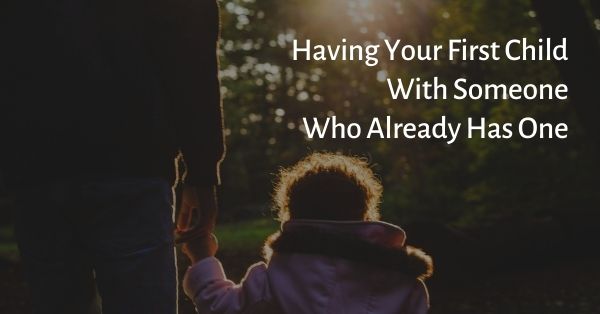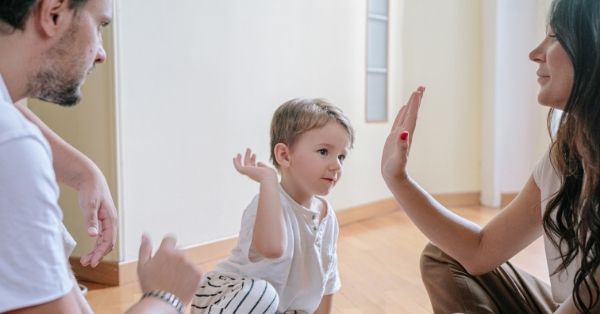When you get married to a partner with a child/children from a previous relationship, get ready to go through unique bitter-sweet experiences. Learn how to win your step-child’s heart patiently because their father (your husband) will always put them first. The good news is that: young children adapt fast. Your consistent acts of love and kindness will make a difference.
Then comes the sweetest part, you just found out you’re pregnant with your first child. I’m sure you’ve been looking forward to giving your husband a child-this is your moment. Soon you’ll be a mother for the first time and your partner will welcome his second child.
But, what is it like having a baby with someone who already has one? What should you expect? Are there any challenges? Let’s find out.

Having Your First Child With Someone Who Already Has One – What to Expect
When you’re having your first child with someone who already has one, there are several things to expect for example, getting divided attention from your partner, random feelings of neglect and resentment, feeling overwhelmed, panic and fear of the unknown. No parenting journey is easy so ensure you have a support system to help you adjust to parenting in a blended family set-up.
Challenges of Having a Baby With Someone Who Already Has One
Partners play a crucial role in pregnancy, delivery and parenthood. A spouse provides emotional, financial and physical support, but the journey could be different if you found him with his first child. Let’s find out some possible challenges associated with having a child with someone who already has a child.
1. He may show less excitement and anticipation throughout the pregnancy.
The truth is, you are on two different levels about parenting. It’s one of the best feelings for you – a new experience. On the other hand, your husband has been there before, so there’s nothing new. Don’t interpret this to mean dislike or disinterest, being his second child, he can’t be as excited as you.
2. Jealousy from the first child
Naturally, older siblings react differently to the birth of a new baby. In blended families, it may be worse because the child has been enjoying his dad’s attention alone.
The fear of getting replaced, and being unsure if you’ll love them like before, make the child get jealous. These unfavourable reactions may stress any parent. According to C.S Mott Children’s Hospital, sparing some one-on-one time every day with the older child helps in curbing sibling jealousy.
3. Co-parenting issues
Having a child with someone who already has a child means he has an ex-wife or partner. They may be having a co-parenting relationship for the sake of their child. The ex-partner may feel like her baby will be neglected with the coming of a new addition to the family. This could lead to disagreements and unnecessary drama. Your partner should reassure both parties that all will be well.
4. You may not have a chance to give your munchkin undivided attention
I know the intrigues of having a first child. You’d want everything to revolve around them as you explore all the lovely moments together. However, you have another child who needs love from you. You have to care for both babies, and it could be overwhelming at first.
5. You may occasionally experience feelings of resentment and frustration
Blended families are complicated. It’s true he already has a child to care for, but you’re having your firstborn with him – that’s enough reason for him to make you feel special.
The absence of your partner when you need him may make you develop feelings of resentment and frustration. That’s understandable. Take one day at a time and discuss your feelings with him. It will make you feel better.
6. Your partner may negatively compare parenting styles
Healthy parenting involves complimenting parenting styles without undermining each other. Someone already having a baby may have his way of parenting. He could be a free-range parent, while you’re the authoritative type. Good therapy explains differing parenting styles as a cause of conflicts in relationships. Comparing such styles may lead to a clashing of ideologies, conflicts and confusion about raising the baby.

Balancing Happiness With a Partner Having a Child With Someone Who Already Has a Child
1. Planning together
It’s wise to prepare for the coming of your baby as a family. The planning involves buying the baby’s clothes, feeding items or toys and it helps create a feeling of anticipation and eagerness to receive the new addition to your family.
2. Communication
Communicate on different aspects concerning the new baby. Let your partner know how you feel about his participation in the preparation process, and what you’d love him to do more. Talk with the older child about his feelings towards having a sibling and reassure him accordingly.
3. Include your partner and child
When having a baby with someone who already has one, make everyone part of the process. While your firstborn is special to you, delegating some roles to your partner is helpful. You may also tell the older child to suggest a name for his brother /sister. The inclusion of every party creates happiness and harmony.
4. Setting clear boundaries on co-parenting
I’m sure you knew your partner has a baby from a previous relationship before settling with them. This means he’s in a co-parenting relationship with his ex-partner. To avoid conflicts, talk with your partner and set practical rules of engagement regarding the other parent.
5. Seek help and psycho-social support
With a previous child or not, the pregnancy and parenting process could be overwhelming. You may experience feelings of resentment and fatigue. Ask your partner to help. Talk to friends and relatives, and if you feel distressed, consult a therapist for professional psycho-social advice.

Wrapping Up
Being part of a blended family is a unique experience. When you’re having your first child with someone who already has one, it means you have someone with some parenting experience which is a plus.
However, there are possible challenges such as differing excitement levels, lack of time with your baby and co-parenting issues leading to divisions and stress in the family.
That said, it’s possible to have a happy family. Once you include the child and your partner in the process, set points of interaction with your partner’s co-parent and talk out when you need help, it’ll make motherhood fun and less stressful for you and your family.